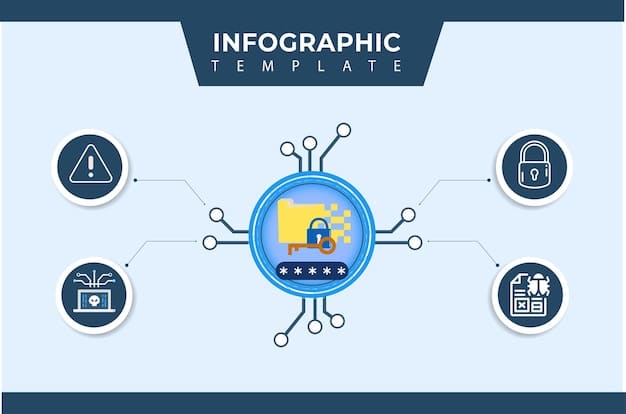US AI Policy 2025: Impact on Startup Innovation Forecast

The updated US AI policy in 2025 is poised to significantly reshape the landscape for startup innovation, potentially fostering a more regulated yet secure environment for development, while also introducing new compliance challenges for emerging companies.
The rapidly evolving field of artificial intelligence presents both immense opportunities and complex challenges, especially for fledgling companies. The question of How Will the Updated US AI Policy Impact Startup Innovation in 2025? is a critical one, and its answer will shape the trajectory of technological advancement and economic growth. Understanding the nuances of these policy shifts is essential for entrepreneurs, investors, and policymakers alike.
Understanding the Current US AI Policy Landscape
The United States has been a global leader in AI development, but its regulatory framework has historically adopted a more hands-off approach compared to regions like the European Union. However, as AI capabilities expand and societal impacts become clearer, a shift towards more structured governance is inevitable. This section will explore the foundational elements of existing US policy and the drivers behind its impending evolution.
Key Pillars of Existing AI Policy
Historically, US AI policy has been characterized by a blend of sector-specific regulations and general ethical guidelines, rather than a single overarching federal law. This decentralized approach has allowed for rapid innovation but has also led to a patchwork of rules and recommendations. Regulatory efforts have primarily focused on:
- Research & Development Funding: Significant investments from agencies like NSF, DARPA, and NIST to foster AI breakthroughs.
- Data Privacy Laws: Regulations such as HIPAA and state-level laws like CCPA, which indirectly affect AI by governing data access and usage.
- Ethical Guidelines: Non-binding principles from bodies like NIST, emphasizing fairness, transparency, and accountability in AI systems.
These pillars have supported a vibrant innovation ecosystem, yet they often lack the teeth to address emerging risks comprehensively. The inherent flexibility has been a double-edged sword, promoting growth while leaving gaps in consumer protection and competitive fairness. The drive for updated policies stems from a collective recognition of these limitations and the escalating stakes involved in advanced AI applications.
The initial approach prioritized fostering a competitive environment, believing that market forces and self-regulation would guide responsible development. This strategy, while successful in stimulating growth, proved insufficient in addressing systemic biases, opaque decision-making processes, and potential misuses of powerful AI technologies. Public concern and international pressure have also played a role, pushing for a more robust and unified federal response. The move towards clearer, more enforceable policies reflects a maturation of the AI landscape and a growing societal imperative to ensure beneficial and safe AI deployment across all sectors.
Anticipated Changes in US AI Policy for 2025
Looking ahead to 2025, the US AI policy is expected to undergo significant refinements, driven by a desire to balance innovation with responsibility. These changes will likely manifest in several critical areas, impacting how startups develop, deploy, and monetize their AI solutions. Policymakers are navigating a complex terrain, aiming to create a framework that is both forward-looking and adaptable to rapid technological advancements.
Focus on Risk Management and Accountability
One of the most prominent anticipated shifts is a stronger emphasis on risk-based regulation. This approach will likely categorize AI systems based on their potential for harm, with higher-risk applications facing more stringent oversight. For startups, this means:
- Pre-market Assessments: Certain AI systems might require detailed impact assessments before deployment, potentially increasing development timelines.
- Accountability Frameworks: Clearer guidelines on who is responsible when AI systems cause harm, compelling startups to implement robust testing and monitoring protocols.
- Standardization and Certification: The introduction of industry-specific standards or certifications for AI products, aiming to build trust and ensure safety.
This proactive stance on risk management signals a move away from purely reactive measures, attempting to address potential issues before they escalate. It reflects a growing global consensus that for AI to be universally beneficial, it must first be demonstrably safe and trustworthy. This could involve new agencies or expanded roles for existing ones to conduct audits and enforce compliance.
Another key area of change will be related to data governance and privacy. As AI systems become more data-hungry, updated policies are likely to impose stricter rules on data collection, storage, and usage, particularly concerning sensitive personal information. Startups will need to be hyper-aware of these evolving privacy mandates, potentially requiring more sophisticated data anonymization techniques and clearer consent mechanisms. The aim is to protect individual rights while still allowing for the data-driven innovation that fuels many AI applications. Transparency regarding data sources and algorithms is also expected to increase, demanding greater openness from developers.
Opportunities for Startups Under New AI Regulations
While new regulations often bring concerns about increased bureaucracy, the updated US AI policy for 2025 could paradoxically unlock significant opportunities for innovative startups. A well-structured regulatory environment can provide clarity, foster trust, and even stimulate entirely new markets. Startups that strategically adapt to these changes will be well-positioned to thrive.
New Markets in AI Compliance and Ethics
The introduction of complex regulations will create a demand for new tools and services that help companies navigate compliance. This presents a fertile ground for startups specializing in:
- AI Governance Software: Platforms that automate compliance checks, track data lineage, and manage AI system documentation.
- Ethical AI Consulting: Firms offering expertise in bias detection, fairness auditing, and responsible AI design.
- Security and Explainability Tools: Solutions that enhance the security of AI models and improve their interpretability for regulatory scrutiny.
These emerging niches represent growth areas that can be directly fueled by regulatory necessity. Furthermore, the emphasis on explainability and transparency within AI systems could lead to specialized tools that help demystify complex algorithms, making them more understandable to both regulators and end-users. This not only fulfills a compliance requirement but also addresses a growing market need for trustworthy AI.

Moreover, clearer guidelines on AI usage can level the playing field, making it easier for smaller startups to compete against larger, more established players. By defining boundaries and expectations, policies can reduce legal ambiguity, thereby attracting more investment into responsible AI ventures. Startups that proactively integrate ethical AI principles into their core product development — rather than viewing them as an afterthought — will gain a significant competitive advantage, appealing to a consumer base increasingly concerned with the ethical implications of technology. This proactive approach can differentiate their offerings and build stronger brand loyalty, demonstrating a commitment to beneficial AI development.
Challenges and Potential Hurdles for Emerging AI Companies
Despite the potential for new opportunities, the updated US AI policy will inevitably present a range of challenges for startups. Emerging companies, often resource-constrained, may find it difficult to adapt quickly to new regulatory requirements and heightened scrutiny. Navigating this evolving landscape will require careful planning and strategic allocation of limited resources.
Increased Compliance Costs and Bureaucracy
For bootstrapped or early-stage startups, the cost of compliance can be a significant burden. New policies may necessitate:
- Legal Expertise: Retaining legal counsel specialized in AI regulation, which can be expensive.
- Development Overheads: Investing in infrastructure and processes for data governance, model testing, and risk assessment.
- Time and Resources: Diverting engineering and product resources from core innovation to ensure regulatory adherence.
These overheads can disproportionately affect smaller companies, making it harder for them to compete with well-funded incumbents. The administrative burden of documentation, reporting, and auditing can also slow down the agile development cycles that are characteristic of successful startups. This could lead to a less dynamic startup ecosystem, where only those with substantial backing can afford to innovate in regulated AI domains.
Another considerable hurdle involves the potential for a “chilling effect” on innovation. Overly prescriptive or ambiguous regulations could discourage daring new ventures or experimental AI applications, particularly in nascent fields. Startups thrive on rapid iteration and a degree of risk-taking, which might be stifled if the regulatory environment becomes too prohibitive or uncertain. There’s also the risk of policy lagging behind technological progress; by the time a regulation is codified, the underlying technology it attempts to govern might have already evolved, creating a perpetual game of catch-up for both regulators and innovators. Balancing protection with progress will be the defining challenge for policymakers and startups alike in the coming years.
Specific Policy Areas to Watch for Impact on Innovation
As the US AI policy evolves, certain specific areas are likely to have a more profound and immediate impact on startup innovation. These include regulations surrounding data, intellectual property, and the very definition of AI systems. Understanding these granular policy shifts will be crucial for startups looking to build compliant and future-proof AI products.
Data Governance and Algorithmic Transparency
The treatment of data is foundational to AI and will likely see significant policy intervention. This includes:
- Data Provenance Requirements: Policies demanding clear documentation of where data originated and how it was collected and processed.
- Algorithmic Auditing: The potential for mandatory external audits of AI algorithms to verify fairness, accuracy, and adherence to ethical guidelines.
- Synthetic Data Standards: As synthetic data gains traction, guidelines on its generation and use will be critical to prevent the amplification of biases present in real-world data.
Stricter data governance could slow down the data acquisition process for some startups but also push them towards more ethical data practices, which can be a differentiator. The push for algorithmic transparency means that merely having a functional AI model will no longer suffice; startups will need to demonstrate *how* it works and *why* it makes certain decisions. This will undoubtedly influence architectural design choices and the types of AI models favored by the industry.
Beyond data, policies around intellectual property (IP) for AI-generated content and inventions are also rapidly evolving. As AI becomes more creative, questions of authorship and ownership become complex. New policies might clarify who owns the IP rights to work generated by an AI tool, or if AI systems themselves can be considered “inventors.” This has direct implications for startups developing generative AI technologies or those using AI to accelerate R&D. Furthermore, the debate around AI liability—who is accountable when an AI system malfunctions or causes harm—will significantly influence how startups manage risk and secure investment, particularly for autonomous systems.
Strategies for Startups to Adapt and Thrive
Given the impending changes in US AI policy, startups must develop proactive strategies to adapt and not just survive but thrive. This involves more than just compliance; it means integrating policy considerations into the very fabric of their business strategy and product development. Agility and foresight will be key differentiating factors.
Proactive Engagement and Internal Expertise
Startups should not wait for policies to be fully enacted; instead, they should:
- Monitor Policy Developments: Stay informed about legislative proposals and regulatory discussions through industry groups and legal updates.
- Build Internal Expertise: Invest in training employees on AI ethics, data privacy, and regulatory best practices.
- Engage with Policymakers: Join industry consortiums or advocate groups to provide input on emerging regulations, helping shape policies that are more startup-friendly.
By proactively engaging with the regulatory process, startups can help ensure that new policies are practical and do not inadvertently stifle innovation. Building internal expertise not only aids compliance but also cultivates a culture of responsible AI development, enhancing the company’s reputation and fostering long-term trust with users and investors. This strategic engagement can turn a potential threat into an opportunity for influence and leadership in the evolving AI landscape.

Furthermore, startups should consider adopting a “privacy-by-design” and “ethics-by-design” approach from the very outset of product development. This means integrating ethical considerations and privacy protections into the core architecture of their AI systems, rather than attempting to tack them on as an afterthought. Such an approach not only ensures compliance but also builds a more robust, trustworthy, and user-centric product. Demonstrating a clear commitment to responsible AI can attract ethical investors, top talent, and a loyal customer base who value transparency and fairness in the technologies they use. Being transparent about data practices and algorithmic decisions will become a competitive advantage, positioning startups as leaders in the ethical AI movement.
Case Studies and Expert Predictions for 2025
To better understand the potential impact of updated US AI policy, examining hypothetical scenarios and expert predictions can offer valuable insights. While 2025 is still a year away, trends and early policy signals allow for informed conjectures about the future landscape for AI startups.
Navigating the New Regulatory Maze
Consider a hypothetical scenario where a startup, “Aether Health,” develops an AI diagnostic tool. Under new 2025 policies, Aether might face:
- Mandatory Clinical Trials: Their AI system, classified as high-risk, requires FDA-like approval processes, similar to new drugs or medical devices.
- Algorithmic Bias Audits: They must prove their AI performs equally well across diverse demographic groups, requiring extensive, verified datasets.
- Data Chain of Custody: Detailed documentation for every piece of patient data used in training, demonstrating ethical acquisition and consent.
This scenario highlights how deeply regulations can intertwine with core product development and market entry. Expert predictions often point to increased scrutiny in sensitive sectors like healthcare, finance, and critical infrastructure, where the societal impact of AI errors is highest. Startups in these domains will likely experience a slower, more deliberate path to market, prioritizing safety and reliability over speed.
Conversely, experts also predict that certain policy changes, particularly those that clarify intellectual property rights or establish interoperability standards, could accelerate innovation in other sectors. For instance, clear guidelines on AI-generated content might encourage more startups to explore creative AI applications in media and entertainment, secure in the knowledge of their ownership rights. Many believe that while initial compliance costs might be a hurdle, a mature regulatory environment will ultimately foster greater public trust in AI, leading to broader adoption and, consequently, larger markets for innovative AI solutions. The challenge for policymakers will be to craft regulations that are precise enough to tackle specific risks without being so broad as to stifle beneficial research and development across the highly diverse AI landscape.
| Key Point | Brief Description |
|---|---|
| ⚖️ Policy Shift | US AI policy in 2025 moves towards risk-based regulation and enhanced accountability, impacting development and deployment. |
| 📈 Opportunities | New markets emerge in AI compliance, ethical AI consulting, and governance software, fostering niche innovation. |
| 📉 Challenges | Increased compliance costs, potential bureaucracy, and a “chilling effect” on high-risk innovation are expected. |
| 🚀 Adaptation Keys | Proactive policy engagement, internal expertise development, and “ethics-by-design” are crucial for startup success. |
Frequently Asked Questions About US AI Policy and Innovation
The primary goal is to strike a balance between fostering AI innovation and ensuring responsible, ethical, and safe deployment of AI technologies. This involves addressing risks like bias, data privacy, and accountability, while still promoting the economic and societal benefits of AI development across industries.
Risk-based regulation will categorize AI systems by potential harm. High-risk applications, like those in healthcare or critical infrastructure, will face stricter pre-market assessments and ongoing oversight. This means increased development timelines and compliance costs for some startups, but also clearer safety standards for users.
While increased compliance costs and bureaucracy could pose initial hurdles for resource-constrained startups, the policies are also expected to create new markets in AI governance and ethics. Proactive engagement and “ethics-by-design” approaches can help startups navigate these challenges and even gain a competitive edge by building trust.
Data governance will be critical, with anticipated policies on data provenance, collection, storage, and usage. Startups will need to adhere to stricter privacy mandates, employ sophisticated data anonymization, and ensure transparency about data sources for their AI models. Algorithmic transparency will also be a key focus.
Startups should proactively monitor policy developments, build internal expertise in AI ethics and compliance, and consider joining industry groups to influence policy discussions. Adopting “privacy-by-design” and “ethics-by-design” principles from the start can embed responsibility into their core products, attracting ethical investors and customers.
Conclusion
The updated US AI policy in 2025 is poised to usher in a new era for startup innovation, marking a definitive shift towards a more regulated, yet potentially more secure and trustworthy, AI landscape. While navigating the evolving terrain of compliance and accountability will undoubtedly present challenges, the proactive integration of ethical considerations and a strategic approach to policy engagement can enable startups not only to survive but to thrive. Ultimately, policies that balance the imperative for innovation with the necessity for responsibility will shape a future where AI serves society broadly and beneficially.





